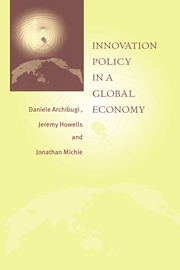Book contents
Foreword
Published online by Cambridge University Press: 05 November 2009
Summary
This is a brilliant set of papers. Unlike many such collections by diverse authors, the standard is uniformly high and even more surprisingly, there is a clear common theme which links them together despite the lack of common authorship. That theme is the elucidation of just what is meant by ‘globalisation’. As Archibugi and Iammarino observe, this is a catch-all concept which is used indiscriminately to describe many diverse phenomena.
In particular, the book concentrates on the ways in which globalisation affects and is affected by technical change and systems of innovation. Over the last decade or somany authors have used the expression ‘national system of innovation’ to describe and analyse those networks of institutions and activities, which in any country, initiate, modify, import and diffuse new technologies. Some of the authors have attributed the origin of this concept to me. This is not accurate. To the best of my knowledge the expression was coined by Lundvall, who contributes the first chapter in this book in which he argues cogently that what matters most is learning, rather than knowledge itself. In any case, as I am sure he would agree, and as several of the chapters point out (e.g. Dosi and Kluth and Andersen) there is a long tradition in economic thought of this combined approach to technical innovation and institutional change, going back at least to Count Serra in Naples.
As this discussion has unfolded, it has become apparent that both the international (‘global’) and the sub-national (‘regional’) dimensions of innovative activities merit investigation and debate as well as the national dimension.
- Type
- Chapter
- Information
- Innovation Policy in a Global Economy , pp. xiii - xivPublisher: Cambridge University PressPrint publication year: 1999

